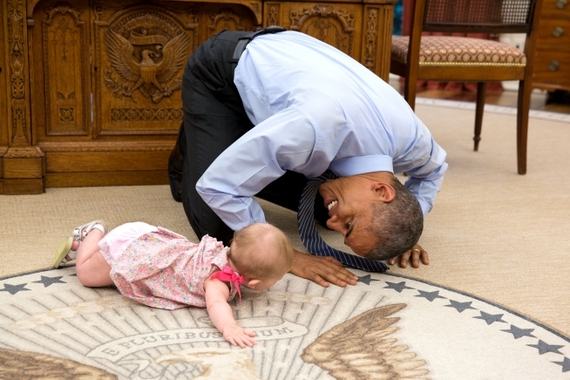
President Obama with Ella Harper Rhodes, daughter of Deputy National Security Advisor Ben Rhodes, in the Oval Office. Photo by Pete Souza.
Have you ever felt humiliated after talking to someone? Have you ever been embarrassed because you didn't know something you were supposed to know? Perhaps this happened in your workplace or school. I felt this way many times in the past, and even now I feel it occasionally.
I vividly remember an incident at my graduate school when I was a new student there. I had several years of real-world industry experience, so I was brimming with confidence and eagerly waiting for my classes to start. On my first day of class, a professor posed a question, and I answered it. I thought I had answered it well. He thanked me politely, and then slowly started to dissect my response. His analysis of it was thorough--and, frankly, I could not comprehend what he said. He was sarcastic and ruthless in his criticism. I am not meek by nature, but I didn't know how to react. So I sat there, totally shaken, ashamed of myself. I felt small and stupid, and my confidence was destroyed. That day, I doubted if I would ever get my doctoral degree.
We must start our interaction with students on their developmental level--one they are comfortable with. For a professor showing off his content knowledge to a student is like an adult showing off his physical strength to a child.
Ever since I myself started teaching, I've replayed this incident many times in my head, trying to understand why some teachers respond this way. I remembered several similar incidents from my childhood involving other students and myself. More recently, I was at a conference in Phoenix, listening to a bunch of undergraduate students presenting their poster. I asked a few questions, and they answered with excitement and enthusiasm. Then another professor stopped by. He took a cursory look at the poster and then launched a tirade of brutal, uncalled-for criticism about it. I saw two young men and a woman change their facial expressions from excitement to bewilderment to disappointment, almost on the verge of crying. This professor, in two or three minutes, had completely shattered their confidence, and perhaps ruined their trip.
Having been in their shoes before, I felt their emotions, particularly since almost all of these professors are well respected by their peers and considered good teachers. Then why do these well-meaning teachers intimidate students and destroy their confidence? It all comes down to communication. Almost all problems we face, both personal and business, can be attributed to poor communication. Even armed conflicts and wars are largely due to miscommunication.
The main reason for professors' miscommunication, I believe, is their mistaken notion that teaching is all about content. Their invincible expertise in a narrow field, their unquestioned status as professors, and their unrealistic expectations from students make some professors arrogant and patronizing without their even realizing it. They need to understand that teaching is not just about content; it is also about communicating. To be a good teacher, you must not only know the content, but also care about your students. How do we do that?
Think of how we interact and communicate with a child. When we talk to a child, we get on our knees to be at her eye level. Or we lift up or carry the child so we can bring her to our eye level. Sometimes we put the child on our lap. We do these things so that the child is at a comfortable enough level to connect with us and the conversation can be intimate, welcoming, and confidence-building. Talking to a three-year-old child while standing tall and looking down at her is impersonal and demeaning. On the other hand, eye-level communication connects to a child at her emotional and developmental level. This is true for adult students as well.
In the professor-to-student context, physical eye level has no significance, but emotional and developmental levels are still crucial. We must start our interaction with students on their developmental level--one they are comfortable with. For a professor showing off his content knowledge to a student is like an adult showing off his physical strength to a child. It is intimidating.
To facilitate confidence-building communication, we must start at the level where students are. We must eliminate unnecessary jargon and difficult language, talk to them in a way they can relate to and understand, and provide meaningful examples that make sense, while, of course, continuing to challenge them to reach new intellectual heights.
So, for the sake of our students, let us stop condescending communication and start confidence-building communication. Both they and us have much to gain from being eye-to-eye with one another.
